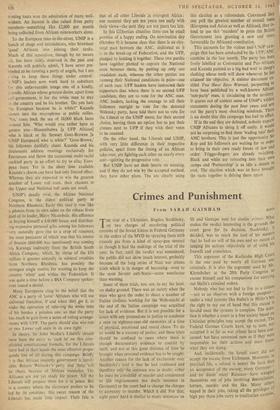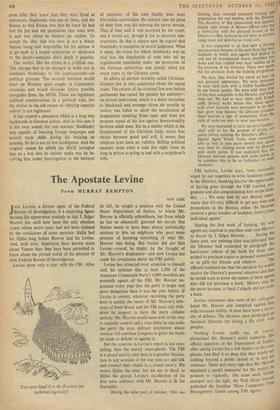Crimes and Punishment
From SARAH GAINHAM BONN
THE trial of a Ukrainian, Bogdan Stashinsky, on two charges of murdering political enemies of the Soviet Union in Federal Germany at the orders of the MVD by spraying them with cyanide gas from a kind of spray-gun seemed as though it had the makings of the trial of the year. In fact, until the verdict was announced, the public did not show much interest, probably because of the long series of Nazi war crimes trials which is in danger of becoming—even to the most fervent anti-Nazis—more wearisome than warning.
Some of these trials, too, are, to say the least, on shaky ground. There was an outcry when the man who gave the order to shoot a number of Italian civilians working for the Wehrmacht act the end of the Italian campaign was acquitted for lack of evidence. But it is not possible for a court with any pretensions to justice to condemn a man on eighteen-year-old memories of a time of physical, emotional and moral chaos. To do so would be a travesty of justice, and these trials should be confined to cases where there is enough documentary evidence to convict by itself, and not at this great distance of time be brought when personal evidence has to be sought. Another reason for the lack of excitement over Stashinsky's trial is that he had confessed and therefore only the sentence was in doubt; either he must be convicted of murder and condemned to life imprisonment (no death sentence in Germany) or the court had to change the charges to accessory to murder. Which it did. For that, eight years' hard is similar to many sentences on SS and Gestapo men for similar crimes. What makes the verdict interesting is the grounds the court gave for its decision. Stashinsky, it decided, was so much the tool of his masters that he had no will of his own and no means of judging his actions objectively or of using his freewill and conscience.
This argument of the Karlsruhe High Court is the one used by nearly all German war criminals. It is also the argument used by Mr. Khrushchev at the 20th Party Congress to excuse himself and his companions for carrying out Stalin's criminal orders.
Nobody who has not had to live as a citizen —not as an observer with a foreign passport" under a total tyranny like Stalin's or Hitler's has the right to say out of hand that this excuse is invalid once the tyranny is complete. The ques- tion is whether a court in a free society based on Christian principles may accept the excuse. Tbe Federal German Courts have, up to now, not accepted it as far as war crimes have been con- cerned, but have sentenced men as if they were responsible for their actions and must know what they are doing.
And, incidentally, the Israeli court did not accept the excuse from Eichmann. Moreover, in practical life, a refusal is nearer the facts than an acceptance of the excuse; many Germans— and no doubt many Russians—have wangled themselves out of jobs involving denunciation, torture, murder and the like. Many others stayed in their jobs, taking all the privileges °f high pay those jobs carry in totalitarian societies,
even after they knew that they were hired as murderers. Stashinsky was one of them, and the reason he fled Russia was that he knew he had lost his job and the perquisites that went with it and was about to become an outlaw. To accept the idea that this man is not a whole human being and responsible for his actions is to go back to a feudal conception of obedience to the death—someone else's death if possible.
The verdict, like the crime, is a political one. The charges had to be changed in order not to condemn Stashinsky to life imprisonment—on political grounds. The severest sentence would react on Western spies caught in Communist countries and would dissuade future possible renegades from the MVD. These are legitimate political considerations in a political trial, but the retreat to the old excuse of 'obeying superior orders' is not legitimate.
It has created a precedent which is a long step backwards in German justice. And in this case it is not even sound, for two reasons; Stashinsky was capable of learning foreign languages and several trade skills during his training as assassin. So he is not of low intelligence. And the original means by which the MVD inveigled him as a boy into its sinister ranks was by in- volving him under interrogation in the betrayal of members of his own family who were Ukrainian nationalists. He claimed that the price of their lives was his entering the secret service. This, if true, and it was accepted by the court, was a moral act, though it led to immoral con- sequences. So that it cannot now be argued that Stashinsky is incapable of moral judgment. What is more, the crime for which Stashinsky was on trial was the liquidation of men who led an organisation manifestly under the protection of the German authorities and closely allied for many years to the German cause.
In affairs of narrow morality called Christian, German law is very concerned about the moral order. The reform of the criminal law now before parliament has raised the penalty for adultery— on private indictment, which is a direct invitation to blackmail and revenge—from six months to twelve; has failed to allow the termination of pregnancies resulting from rape; and does not propose repeal of the law against homosexuality between adult men. Yet in a matter which is the fundamental of the Christian faith, man's free choice between good and evil, it seems that religious laws have no validity. Killing political enemies twice costs a man just eight times as long in prison as going to bed with a neighbour's wife.















































 Previous page
Previous page